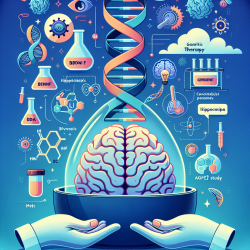The world of therapy is ever-evolving, with new research continuously challenging and expanding our understanding of the human brain. One such groundbreaking study is the "Effect of BDNF Val66Met on hippocampal subfields volumes and compensatory interaction with APOE-?4 in middle-age cognitively unimpaired individuals from the ALFA study." This research offers valuable insights into genetic influences on brain structure and function, which can be transformative for practitioners seeking to enhance their therapeutic approaches.
The Research at a Glance
The study focuses on the BDNF Val66Met polymorphism and its impact on hippocampal subfield volumes in cognitively unimpaired individuals. Additionally, it examines the interaction between this polymorphism and the APOE-?4 allele, a known genetic risk factor for Alzheimer's disease. The findings reveal that carriers of the BDNF Val66Met polymorphism exhibit larger volumes in specific hippocampal subfields, suggesting a compensatory mechanism that may mitigate some effects associated with APOE-?4.
Implications for Therapy Practice
Understanding the genetic underpinnings of brain structure can significantly influence therapeutic strategies. Here are some ways practitioners can leverage these findings:
- Personalized Therapy: By considering a client's genetic profile, therapists can tailor interventions that align with their unique neurobiological makeup. This personalized approach can enhance treatment efficacy and client satisfaction.
- Cognitive Resilience Building: The compensatory effects observed in BDNF Val66Met carriers suggest potential pathways for enhancing cognitive resilience. Therapists can incorporate exercises and activities that promote neuroplasticity and support hippocampal health.
- Early Intervention Strategies: For clients with a genetic predisposition to cognitive decline, early intervention focusing on lifestyle changes and cognitive training could delay or prevent the onset of symptoms.
The Path Forward: Encouraging Further Research
This study opens up numerous avenues for further exploration. Practitioners are encouraged to stay informed about ongoing research in genetic influences on cognition and mental health. Collaboration with researchers can lead to innovative therapeutic techniques that harness these genetic insights.










